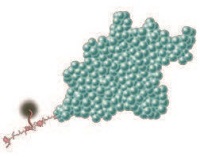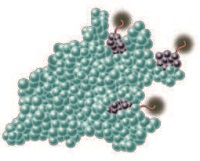MABSOL® Biotinylated Proteins
Product Series
MABSOL® biotinylated protein collection includes two unique and complimentary product series, the PrecisionAvi series built upon the AviTag technology, and the UltraLys series produced using the in-house developed chemical labeling method. These products are made with every attention to details.
PrecisionAvi Series
An exclusive collection of ready-to-use AviTagTM biotinylated proteins
The products in this series are exclusively produced using the AviTagTM technology. Briefly, a unique 15 amino acid peptide, the Avi tag, is introduced into the recombinant protein during expression vctor construction. The single lysine residue in the Avi tag is enzymatically biotinylated by the E. coli biotin ligase BirA.
the Avi tag, is introduced into the recombinant protein during expression vctor construction. The single lysine residue in the Avi tag is enzymatically biotinylated by the E. coli biotin ligase BirA.
This single-point enzymatic labeling technique brings many advantages for commonly used binding assays.
- The biotinylation only happens on the lysine residue of Avi tag.
- NO interference with the target protein's natural binding activities.
- The protein orientation is uniform when immobilized on an avidin-coated surface
UltraLys Series
A unique series of chemically labelled biotinylated proteins with ultra-sensitivity
The product in this series are produced using our in-house developed chemicals labelling approach. The primary amine side chains of lysine residues and the N-terminus of protein are conjugated with biotins.
- Higher detection sensitivity
In-house developed chemical labelling approach
Key Features
Closest to Natural Conformation and Modification
The Production of our recombinant proteins including the biotinylated proteins is carried out using our proprietary HEKMax® expression platform. As expression hosts, the human HEK293 cells have a variety of advantages compared to other cell types as summarised in the table below.
Expression | Folding | Phosphorylation | Proteolytic Processing | Glycosylation |
| E. coli | + | + | + | N/A |
| Insect cell | + | ++ | ++ | Poor |
| Plant cell | +++ | +++ | +++ | Poor |
| CHO cell | ++++ | ++++ | ++++ | Non-human like |
| Human cell | +++++ | +++++ | +++++ | Human Authentic |
High Bioactivity & Detection Sensitivity
The bioactivity of biotinylated proteins is determined both by the structure of the protein itself, and by the way how biotinylation is performed. For every single protein, we test multiple options of tags and biotinylation methods, and evaluate the products in a variety of binding assays. Only those with the best performance are selected for production. Figure 1 is an example of internal evaluation experiements.
Fig. 1 Binding activity of different forms of biotinylated PD-1 evaluated in a functional ELISA against rhPD-Ll {Cat. No. PD1-H5258}.
Low Batch-to-Batch Variation
We routinely apply rigorous quality control measures to ensure consistent performance of our products. Newly produced products are subjected to side-by-side comparison with our internal standard in a variety of assays.
Only those within an acceptable margin of difference are allowed to be released. As demonstrated in figure 2, three different batches of biotinylated hTNF-alpha (Cat. No. TNA-H82E3} are tested and compared using a standard ELISA analysis against Adalimumab, the result shows that the batch variation among the tested samples is negligible. The batch-to-batch conformance is also good as displayed in cell based assay (Fig. 3).
Fig. 2 In the above left ELISA analysis, three different Jots of biotinylated hTNF-alpha (Cat. No. TNA-H82E3) were used detect immobilized Adalimumab (0.5 µg/ml). The result showed that the batch variation among the tested samples is negligible.
Fig. 3 In the above right Recombinant biotinylated human TNF-alpha (Cat. No. TNA-H82E3} induces cytotoxicity effect on the WEH1-13VAR cells in the presence of the metabolic inhibitor aetinomycin D. The EC50 for this effect is 0.029-0.052 nglml.
